Lenses and Mirrors
Lenses and Mirrors: Overview
This topic covers concepts, such as, Total Internal Reflection, Critical Angle, Number of Images Formed Due to Multiple Reflections in Plane Mirror & Angular Dispersion at a Single Surface etc.
Important Questions on Lenses and Mirrors
A convex lens forms an object on a screen. The height of the image is 9 cm. The lens is now displaced until an image is again obtained on the screen. The height of this image is 4 cm. The distance between the object and the screen is 90 cm.
Which of the following can form diminished, virtual and erect image of your face
A lens is placed in the coordinate system such that its optical center is at the origin and the principal axis is along the axis. The focal length of the lens is . A point object has been placed at the point (). Which of the following are correct about coordinates of the image?
A luminous point object is placed at , whose images is formed at as shown in the figure. is the optical axis. Which of the following statements are correct?

In the figure shown consider the first reflection at the plane mirror and second at the convex mirror. AB is object

It is desired to make an achromatic combination of two lenses and . If the combination of lenses is converging then
A beam of light consisting of red, green and blue and is incident on a right angled prism. The refractive index of the material of the prism for the above red, green and blue wavelength are 1.39, 1.44 and 1.47 respectively. The prism will

A thin prism of angle is placed at a distance of from the object. The distance of the image from the object is (given of prism)
A prism has a refractive index and refracting angle . Find the minimum deviation produced by prism
A ray incident at angle 53o on a prism emerges at an angle at 37o as shown. If the angle of incidence is made 50o, which of the following is a possible value of the angle of emergence.
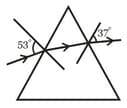
A planoconvex lens, when silvered at its plane surface is equivalent to a concave mirror of focal length . When its curved surface is silvered and the plane surface not silvered, it is equivalent to a concave mirror of focal length , then the refractive index of the material of the lens is
A screen is placed from an object. The image of an object on the screen is formed by a convex lens at two different locations separated by . The focal length of the lens is
A converging lens of focal length 20 cm and diameter 5 cm is cut along the line AB. The part of the lens shown shaded in the diagram is now used to form an image of a point P placed 30 cm away from it on the line XY. Which is perpendicular to the plane of the lens. The image of P will be formed.

An object is placed in front of a thin convex lens of focal length 30 cm and a plane mirror is placed 15 cm behind the lens. If the final image of the object coincides with the object, the distance of the object from the lens is
A thin lens of focal length and its aperture has a diameter . It forms an image of intensity . Now the central part of the aperture upto diameter is blocked by an opaque paper. The focal length and image intensity would change to
An object is placed at a distance of from a convex lens of focal length . On the other side of the lens, a convex mirror is placed at its focus such that the image by the combination coincides with the object itself. What is the focal length (in cm) of the convex mirror?
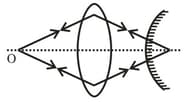
A object is placed at a distance of 15 cm from a convex lens of focal length 10 cm. On the other side of the lens, a convex mirror is placed at its focus such that the image by the combination coincides with the object itself. The focal length of the convex mirror is
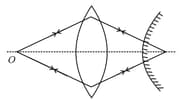
Parallel beam of light is incident on a system of two convex lenses of focal lengths and . What should be the distance between the two lenses so that rays after refraction from both the lenses pass undeviated
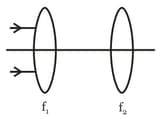
A spherical thick shell made of transparent material is cut along its chord as shown. The smaller part will
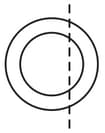
When the object is at distances u1 and u2 the images formed by the same lens are real and virtual respectively and of the same size. Then focal length of the lens is
